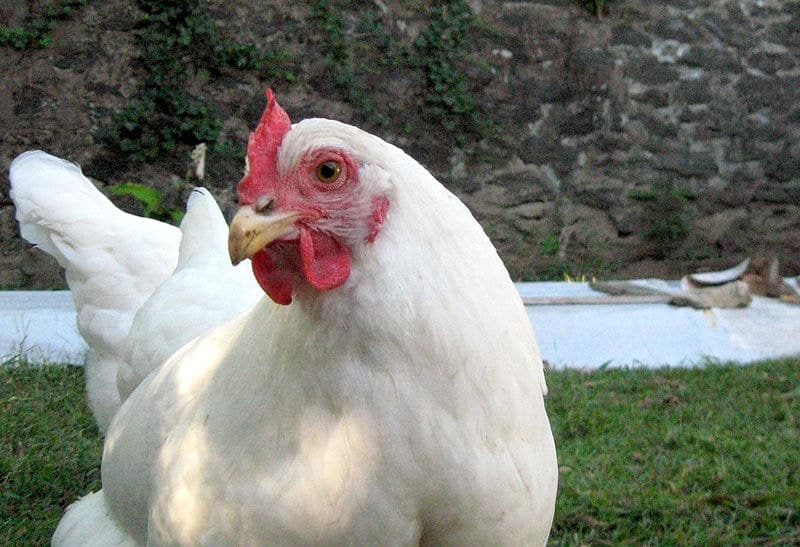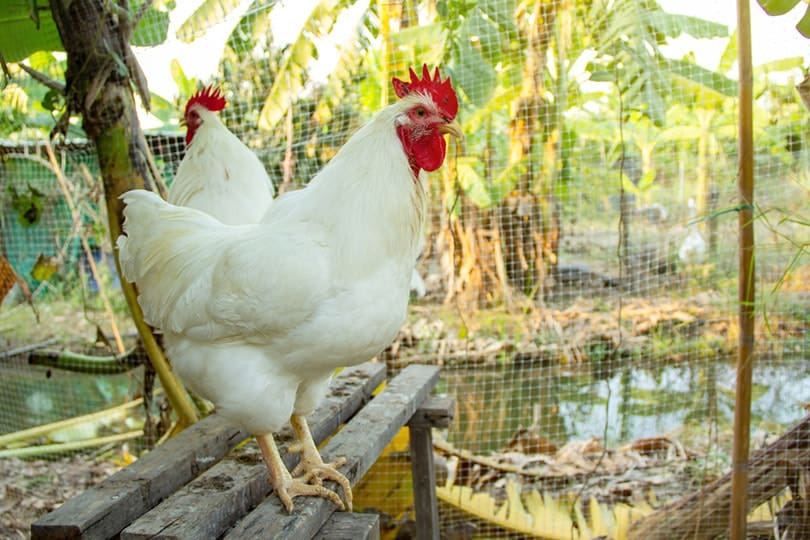The Rhode Island White Chicken is an extremely rare heritage chicken breed. These birds have beautiful feathers and are quite friendly. They provide good volumes of eggs, are excellent foragers, and are hardy animals that do well free-range but are also happy when confined to a coop. They sound like the perfect chicken, but there are a few things that you should know before you get your own Rhode Island White.

Quick Facts About Rhode Island White Chicken
| Breed Name: | Rhode Island White Chicken |
| Place of Origin: | United States |
| Uses: | Eggs, Meat |
| Rooster (Male) Size: | 8.5 lbs. Bantam (miniature): 34 oz. |
| Hen (Female) Size: | 6.5 lbs. Bantam (miniature): 30 oz. |
| Temperament: | Friendly, docile, moderate aggression to other flock members |
| Foraging Ability: | Good |
| Color: | White |
| Lifespan: | 5–8 years |
| Climate Tolerance: | Poor to exceptional cold tolerance (dependent on comb size) Moderate to good heat tolerance |
| Care Level: | Moderate to high |
| Production: | Good egg-laying ability, good meat production |
| Noise Level: | Moderate to high |
Rhode Island White Chicken Origins
The name of the Rhode Island White Chicken is fairly self-explanatory. These beautiful white birds were first developed in the state of Rhode Island in 1888.
A poultry farmer named J. Alonzo Jacoy from the town of Peacedale developed the breed out of a desire for a good dual-purpose chicken. He was looking for a chicken that would produce decent quantities of eggs, as well as meat.
- Cochins — chickens with a good meat yield
- White Leghorns — exceptional egg layers
- Wyandottes — a hardy, dual-purpose breed
Rhode Island White Chicken Characteristics
They’re not built for breeding
As a rule, the Rhode Island White is not a broody breed of chicken. So, while they are reliable egg layers, they are not interested in sitting on their eggs and hatching chicks. If you want hens to raise chicks, you will be better off with another breed.
They are heat tolerant
These chickens aren’t as fluffy as other cold-tolerant breeds, and they tend to deal with heat better than cold. However, they do produce significant amounts of down feathering to keep them warm and will still do well in cold climates with appropriate shelter and heating.
Varieties of Rhode Island Whites with a single comb are more prone to frostbite than rose comb varieties. Rose comb varieties are more cold-hardy, while single-combed birds are at high risk of frostbite. This characteristic isn’t unique to Rhode Island Whites. Almost all chickens with single combs breeds have a high frostbite risk, and roosters are at higher risk than hens.
They warn about predators
Rhode Island Whites are a smart, hardy chicken breed. They are fantastic at alerting the presence of predators and warning other flock members of potential threats. While this may be annoying for owners who find their chickens screeching at the family dog, it offers a significant advantage should a coyote or fox come prowling around your coop.
There is one major drawback of the Rhode Island White when it comes to predators: their beautiful white plumage. Their color makes them a glowing beacon for all the predator world to see. Homesteaders and chicken farmers refer to this problem as “white bird syndrome,” since it’s an issue that occurs with any white chicken breed.

They are friendly to people
You can expect Rhode Island White Chickens to be docile and extremely friendly. Since they are happy to be kept in a fenced area or coop or to roam free, they make good “pets” or backyard chickens. Even the roosters don’t have a reputation for being aggressive, although this is never a guarantee.
Their friendliness to humans does not translate toward other breeds of chickens. If Rhode Island Whites are kept in a flock of their own kind, they get along with each other. But if you introduce other chicken breeds, it goes sideways. Even the hens can be extremely aggressive toward other hens and roosters.
It doesn’t mean they can’t be kept in a mixed flock, but it’s important to be deliberate about choosing similarly assertive breeds. Small, vulnerable breeds like Silkies are at high risk of being killed when paired with Rhode Island Whites. The safest way to keep mixed flocks of chickens is to choose other birds that are the same color because hens like hens that look like them. While this concept seems offensive to us, it’s the way of the chicken world and applies to all breeds, not just Rhode Island Whites.
They are extremely noisy
Rhode Island Whites are noisier than your average chicken. They squawk, talk, and gossip regularly. This is great if you live on a homestead or farm because it keeps predators away or warns you of their presence. If you are keeping backyard chickens in an urban setting, these vocalizations are less than ideal.
Rhode Island White crosses are sex-linked
If you are an urban chicken keeper, this is significant. Many varieties of Rhode Island White chicken crosses create sex-linked birds. If you are new to chickens, here’s what this means and why it’s important.
When you order hens, or female chicks, from a hatchery, it is practically a guarantee that you will end up with one or more roosters. This is because it is difficult to determine the sex of a chicken after hatching. Most are sexed using vent-sexing, a method that is only accurate about 90% of the time. At many hatcheries, the odds are much worse.
Here’s where the sex-linking comes in. Rhode Island Whites that are sex-linked can be sexed at birth with nearly 100% accuracy because the males and the females look completely different. If you’re in an urban environment, this is great news! Most places don’t allow roosters, so if you accidentally get a rooster, you will most likely have to kill it. Sex-linked birds avoid this unpleasant situation.
Uses
Rhode Island Whites can be used as egg producers or as a source of meat. They are dual-purpose chickens, but some varieties have been bred with a specific focus on egg production rather than meat. These chickens are smaller in stature and are most commonly sold by commercial hatcheries.
The eggs of the Rhode Island White are large to extra-large in size, and each hen produces approximately four to five eggs per week. This works out to an average of 200–250 large eggs per year for each hen that you own.
Rhode Island Whites developed for meat production have fast maturity rates, good sizes, and phenomenal taste. Chickens bred for meat won’t lay as well, but they’re solid birds that offer a market weight of 5.5–7.5 lbs.
Appearance & Varieties
Rhode Island Whites have solid white plumage with yellow beaks and legs. They have a brick-shaped body, reminiscent of their cousins, the Rhode Island Reds.
The original Rhode Island White chickens had medium-sized rose combs, and this is the only variety recognized by the American Poultry Association. However, many of today’s strains of Rhode Island Whites have medium to large single combs.
The head of the Rhode Island White Chicken is deep and tends to be flat on top rather than round. These birds have medium-sized wattles, reddish-bay-colored eyes, and red, oblong-shaped ear lobes.
While they are usually considered moderate-sized chickens, Rhode Island Whites also come in bantam, or miniature, versions.
Population/Distribution/Habitat
Rhode Island White Chickens are rare and in need of conservation efforts. While they were popular birds during the first half of the 20th century, their popularity declined after the 1960s. The population continues to decline today.
The Rhode Island White has been granted a breed status of “threatened” by the Livestock Conservancy. Breeding flock numbers in the United States are dangerously low, and close to nonexistent worldwide.
One breeding operation in Manitoba, Canada, called Breezy Bird Farms, has been breeding the original rose comb variety of Rhode Island White since 2017. It is the first of its kind, and it’s making an impact on increasing numbers of Rhode Island White chickens as they ship hatching eggs throughout the country.

Is Rhode Island White Chicken Good for Small-Scale Farming?
Yes, Rhode Island White Chickens are great for homesteads or small-scale farms. These birds are known for their superior egg-laying capabilities and will provide you with a decent number of eggs. Since they are also good winter layers, they are reliable producers year-round.
As meat birds, Rhode Island Whites are a solid choice. Just make sure to choose a variety bred for size and meat rather than laying.

Final Thoughts
Rhode Island White Chickens are an extremely rare dual-purpose chicken breed. They are a breed of their own, with numerous unique characteristics. They are a friendly, adaptable, and hardy breed that is easily kept in a variety of housing situations. Unfortunately, this breed is declining in numbers, and breeding operations are few.
Related chicken breed reads:
Featured Image Credit: Ton Bangkeaw, Shutterstock
